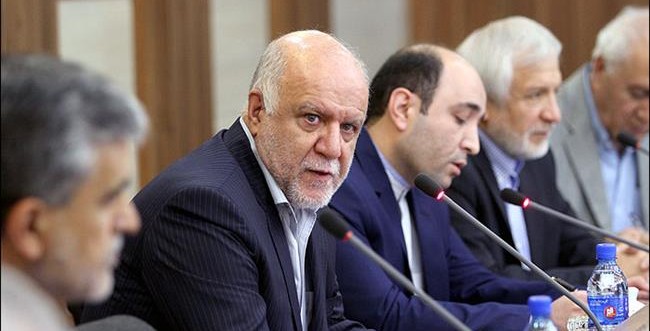PHOTO: Iranian Oil Minister Bijan Namdar Zanganeh
LATEST
- Foreign Ministry: “First Phase” of S-300 Missile Contract with Russia Implemented
- Supreme Leader’s Top Aide Repeats: “Keeping Assad Is Our Red Line”
Iran has lashed out at Saudi restrictions on its oil exports, declaring that Riyadh cannot ban Iranian tankers from travelling in international waters.
“What specific power does Saudi Arabia have to ban Iran’s tankers?” Oil Minister Bijan Zangeneh asked reporters on Saturday.
The Financial Times reported last Monday that Saudi Arabia and its ally Bahrain have blocked Iranian ships from entering their ports. Iran has also been unable to access some oil in storage at a Egyptian facility which is partially owned by the Saudis.
Parviz Mina, a former Iranian member of the OPEC Long-Term Strategy Committee insisted that tankers which load oil from Iran’s main terminals at Kharg and Lavan do not need to enter Saudi territorial waters. He said that the route was “hardly a major factor” in Persian Gulf shipping lines, and that a problem will only occur in the unlikely event that a tanker loads oil from both Iran and Saudi Arabia.
Oil Minister Zanganeh has said that Iran wants to soon raise oil exports from its level of 1.4 million barrels per day in January, when Tehran’s nuclear deal with the 5+1 Powers was implemented, to 2 million bpd.
However, despite a proclamation from 1st Vice President Eshaq Jahangiri that Iran is already exporting 2.2 million bpd, industry analysts say the figure is still about 1.6 to 1.7 million bpd.
In addition to the Saudi pressure, Iran is having difficulties renewing exports to European markets because of remaining US sanctions on financial transactions.
Foreign Ministry: “First Phase” of S-300 Missile Contract with Russia Implemented
Foreign Ministry spokesman Hossein Jaberi Ansari has declared the implementation of the “first phase” of a contract with Russia for the delivery of S-300 anti-aircraft missile systems.
Russia and Iran signed a contract for the S-300s in 2007, but Moscow suspended the deal in 2010 amid US and Israeli objections. Last year, Russian President Vladimir Putin suddenly lifted the suspension; however — despite repeated promises by Iranian officials that the deliveries were imminent — the systems have yet to appear in Iran.
Jaberi Ansari said on Monday:
We had already announced that, despite several times of change in time of delivery, the deal is on its path of implementation. Today I should announce that the first phase of the agreement is implemented and the process will continue.
The spokesman did not define what the “first phase” of implementation entails.
Jaberi Ansari also the UN envoy for Syria, Staffan de Mistura, will arrive in Tehran Monday night ahead of the renewal of political talks on April 13.
Supreme Leader’s Top Aide Repeats: “Keeping Assad Is Our Red Line”
As Iran puts in more troops into Syria, the Supreme Leader’s top aide has repeated that President Assad’s stay in power is a “red line” for Tehran.
Ali Akbar Velayati said on State TV on Saturday night, “The US says that Bashar Assad should leave, but Assad should remain in power as Syria’s legal president until the end of his presidential term and that is our red line.”
Velayati, a former Foreign Minister, said Iran will not leave Assad alone either on the battleground or in politics.
The aide has set out the red line repeatedly since November, soon after a Russian-Iranian military intervention to prevent the collapse of Assad and his armed forces, as he met Assad in Damascus.
See Iran Daily, Nov 20: Supreme Leader’s Aide — “Assad Stronger Than Ever”
(Cross-posted from Syria Daily)

